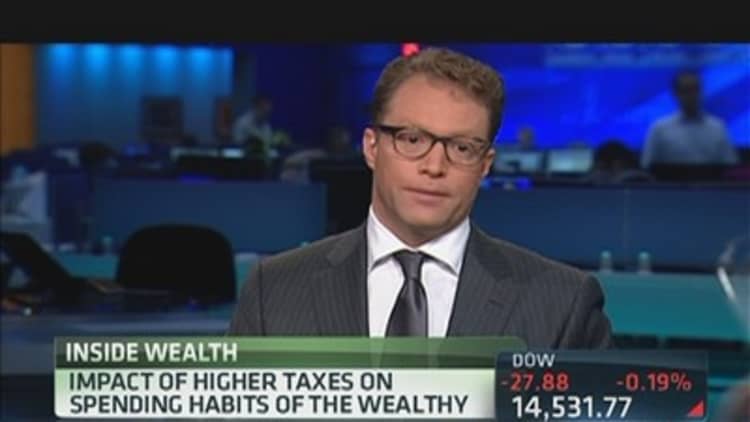Before Jan. 1, many warned that taxing the wealthy would snuff out the recovery. If the wealthy had to pay more taxes, they would spend less, invest less and give less to charity. So far, it doesn't seem to be happening—at least not on a large scale.
According to a new poll, a majority of people making $500,000 or more (those paying the higher income tax rate) said that the tax hikes have not impacted their spending, charitable giving or investment strategies.
The Shullman Luxury and Affluence Monthly Pulse found that 55 percent of people making $500,000 or more said higher taxes have not impacted their spending plans. Fully 61 percent of those making $250,000 or more said taxes have not impacted their spending plans.
On investing, 59 percent of those making $500,000 or more (and 64 percent of the $250,000-plus group) said higher taxes have not impacted their investment strategies. When it comes to charity, 55 percent of those making $500,000 or more, and 62 percent of those making $250,00 or more, said paying more taxes has not impacted their giving plans.
(Read More: Rich Give Less, But May 'Invest in Solutions' More)

Granted, there are still plenty of high earners who have changed their spending or investing due to taxes. But less than a quarter of the folks earning $500,000 or more said they would reduce their spending this year because of higher taxes.
The high earners are also lukewarm on the economy. About a third of those making $250,000 are very optimistic about the economy, a third are pessimistic about the economy. Business owners are more optimistic than non-business owners.
(Read More: Who's Spending? The Rich—Of Course)
Affluent women are far more bearish on the economy than men. The survey found that among those making $250,000 or more, 46 percent of men are optimistic about the economy compared with 21 percent of women.
Taxes may not have hurt spending yet. But the survey suggests the wealthy could cut back if they rise again. When asked whether additional taxes would hurt spending, 50 percent of those making $500,000 and 56 percent of those making $250,000 agreed.
(Read More: Fed Now Concerned About US Wealth Inequality)
Of course, those household spending cuts may turn out to be more of a threat than reality.
—By CNBC's Robert Frank


